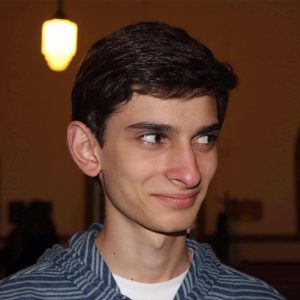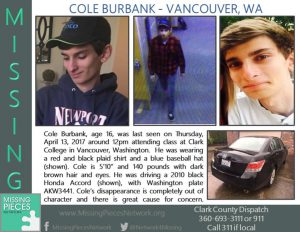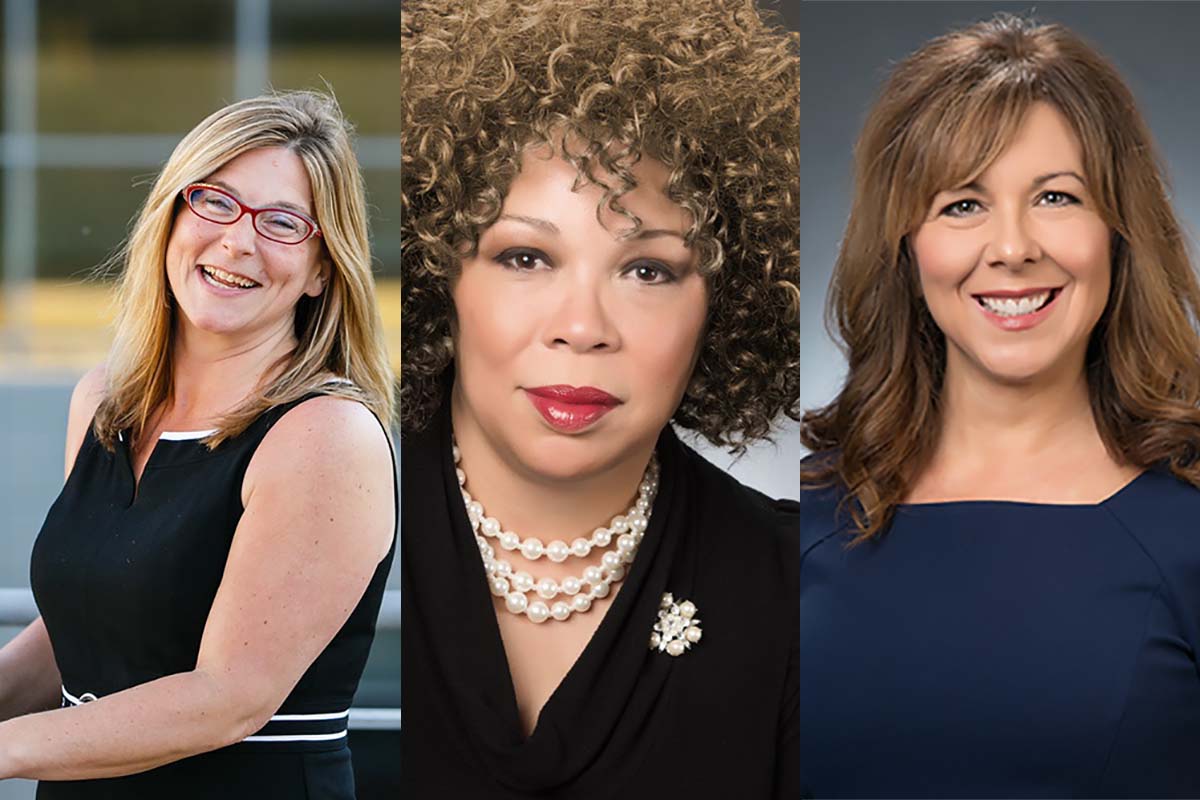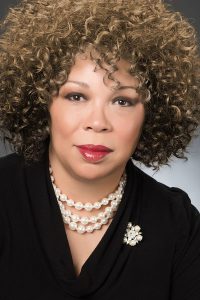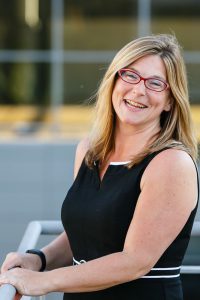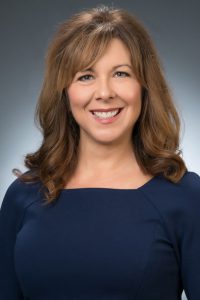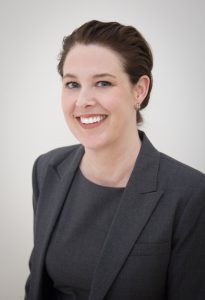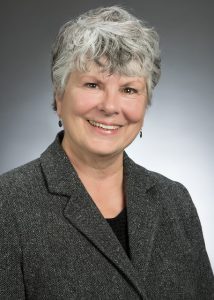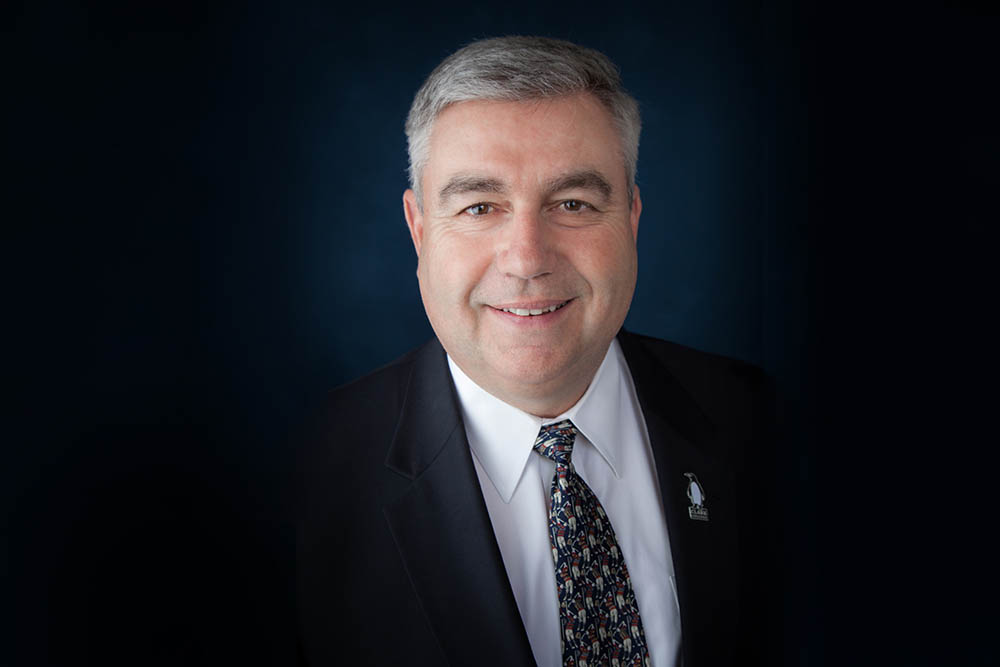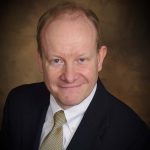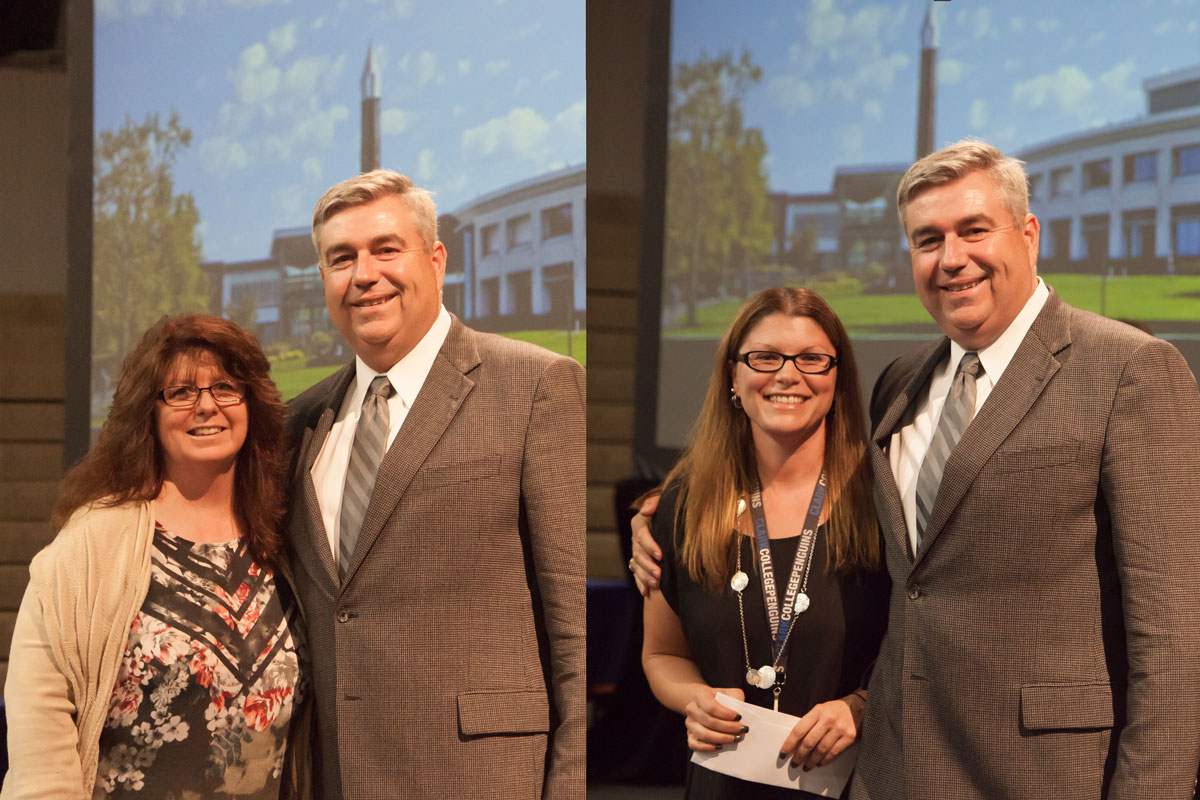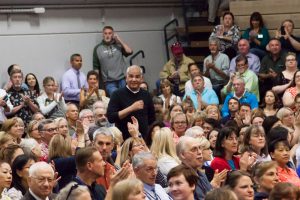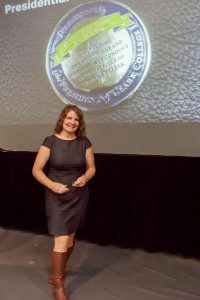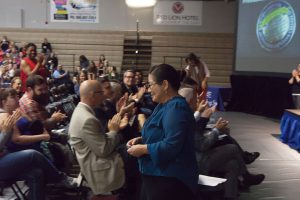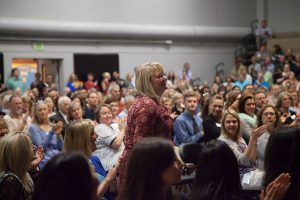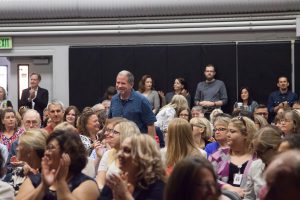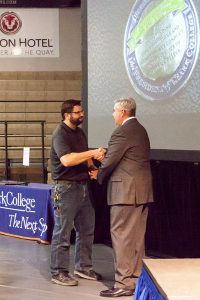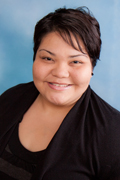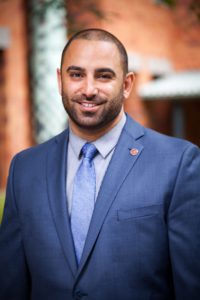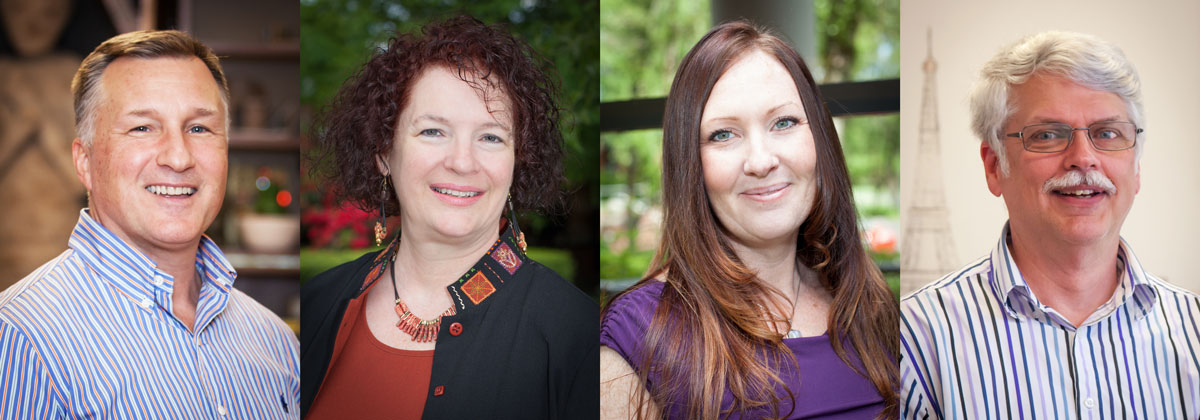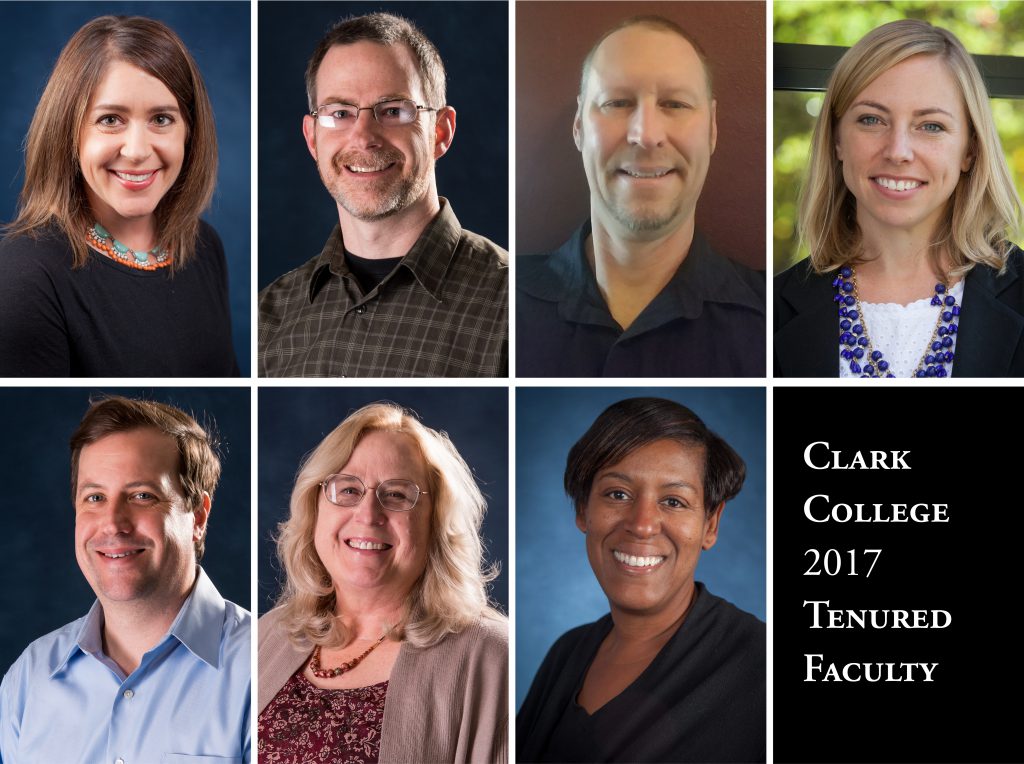
Top row, left to right: Dr. Lindsay Christopher, Michael Ludwig, Brian McVay, Alexis Nelson. Second row: Toby Peterson, Mary Ellen Pierce, and Lora Whitfield
Seven outstanding educators are the newest members of the tenured faculty at Clark College. Dr. Lindsay Christopher (English), Michael Ludwig (dental hygiene), Brian McVay (welding), Alexis Nelson (English), Tobias Peterson (English), Mary Ellen Pierce (nursing), and Lora Whitfield (early childhood education) were all granted tenure during the Clark College Board of Trustees meeting on March 14.
Tenure is awarded by the college’s Board of Trustees based on professional excellence and outstanding abilities in their disciplines. The granting of tenure is based on the recommendations of tenure review committees to the vice president of instruction, which are then forwarded to the president, who presents a final recommendation to the Board of Trustees. Recommendations are based on self-evaluations, tenure review committee evaluations, student evaluations, supervisory evaluations, and peer evaluations. The final decision to award or withhold tenure rests with the Board of Trustees.
“Tenure is a landmark moment—both in the careers of the individual faculty members, as well as in the history of the college as a whole,” said Dr. Tim Cook, Vice President of Instruction. “These faculty members will become a crucial part of the college’s community and will help shape its curriculum and character for years to come. I look forward to seeing these talented and passionate educators contribute to Clark’s collective legacy.”
About the faculty members
Dr. Lindsay Christopher
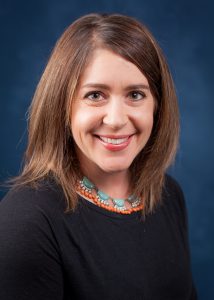
Dr. Lindsay Christopher holds bachelor’s and master’s degrees in English from Mercyhurst College and University of Buffalo, respectively. She earned her Ph.D. in Literary Studies from the University of Denver. Her teaching experience includes the University of Denver, Arapahoe Community College, and Clark College.
At Clark, Dr. Christopher has participated in college-wide initiatives focused on integrative learning; power, privilege, and inequity; open education resources; and the college’s “common read” book and theme. She leads the English Department’s literature and technical writing work groups and has also taught “Introduction to Clark College,” a course designed to help new Clark College students succeed at the college.
“At the core of my teaching practice is the conviction that when students engage in active inquiry in a diverse curriculum that honors their experience, they begin their journeys to becoming powerful thinkers and creators, innovative leaders, and dynamic citizens,” said Dr. Christopher.
Michael Ludwig
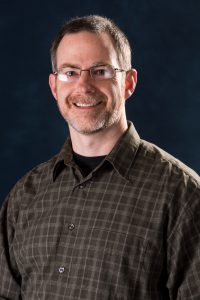
Michael Ludwig is a Clark College alumnus, having received his Associate of Applied Science in Dental Hygiene from the college in 1997. He also holds a Bachelor of Science in Dental Hygiene from Eastern Washington University and is completing his Master of Education degree in Educational Leadership from Concordia University.
Ludwig has 16 years of professional experience as a dental hygienist in private practice and 14 years of teaching experience at Clark College. He currently serves as the Lead Restorative Instructor in the college’s Dental Hygiene program.
“Students learn in a variety of ways,” said Ludwig. “My approach is to utilize a variety of teaching methods to reach as many students as possible in an organized manner while providing clear goals and expectations.”
Brian McVay
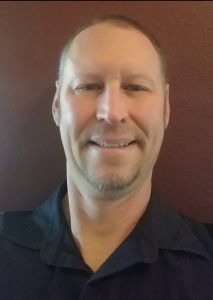
Brian McVay is also a Clark alumnus, having attended Clark’s welding program before going on to a four-year ironworker apprenticeship. He has work experience as an ironworker, a quality assurance inspector at Cascade General Shipyard, and as an ultrasound operator for nondestructive testing. McVay, who has taught at Clark for three years, is a Certified Welding Inspector and a Washington Association of Building Officials (WABO) Test Examiner.
At Clark, McVay helps advise future students and gives tours of the welding program. He is the faculty advisor of the Clark College Welding Club and administers WABO weld testing. He is also active in outreach work to regional industry to assess its needs.
McVay says his teaching philosophy involves showing the real-world applications of lesson material and making sure students understand the material thoroughly.
Alexis Nelson
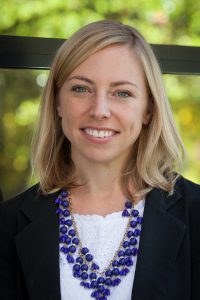
Alexis Nelson earned her bachelor’s degree in English from the University of California at Santa Barbara and her Master of Fine Arts in Creative Writing with a nonfiction emphasis from Portland State University. She has teaching experience at both PSU and at Clark.
At Clark, Nelson has served as co-director of the Columbia Writers Series and has grown it from an annual to a quarterly event. She also founded Subtext, the college’s annual literary festival, and serves as co-advisor for the college’s creative writing club.
“My approach to teaching is hands-on and student-centered, with an emphasis on group discussion, workshopping of student writing, and learning to read as writers,” said Nelson.
Tobias Peterson
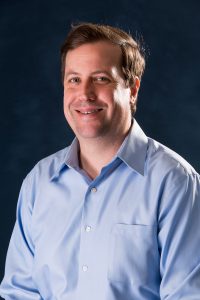 Tobias Peterson holds bachelor degrees in both Spanish Literature and English from the University of Texas at Austin. He earned a Master of Arts in English from George Mason University and a Master of Fine Arts in Creative Writing with a focus on poetry from Texas State University. Peterson has teaching experience at Austin Community College, Texas State University, Portland State University, Clackamas Community College, and Clark College.
Tobias Peterson holds bachelor degrees in both Spanish Literature and English from the University of Texas at Austin. He earned a Master of Arts in English from George Mason University and a Master of Fine Arts in Creative Writing with a focus on poetry from Texas State University. Peterson has teaching experience at Austin Community College, Texas State University, Portland State University, Clackamas Community College, and Clark College.
At Clark, Peterson has served on numerous college-wide committees and task forces, including Planning and Accreditation, Program Improvement Process, Teaching and Learning, Opening Day Planning, Strategic Plan Development, Credit for Prior Learning, and Title III Grant. He serves as the evidence chair for the Academic Excellence Core Council and is the former co-chair of the Outcomes Assessment Committee. Within the English Department, he serves on the Creative Writing and the Technical and Professional Writing committees. He also helps coordinate the annual Clark Crossings Reading Series.
Peterson described his approach to teaching as “outcomes-focused and project-driven. I see my role as a ‘guide on the side,’ to inspire, enable, and empower my students to meet learning goals in applied settings and through practical application.”
Mary Ellen Pierce
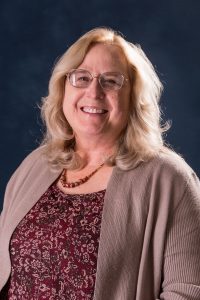 Mary Ellen Pierce earned her Bachelor of Science in Nursing from the University of Alaska and her Master of Science in Nursing from the University of Phoenix. She has 35 years of work experience as a registered nurse working in a variety of settings, including hospitals, post-acute care, community-based care, and legal nurse and health care consulting. She has extensive experience in nursing administration, as well as four years of experience as a nurse educator.
Mary Ellen Pierce earned her Bachelor of Science in Nursing from the University of Alaska and her Master of Science in Nursing from the University of Phoenix. She has 35 years of work experience as a registered nurse working in a variety of settings, including hospitals, post-acute care, community-based care, and legal nurse and health care consulting. She has extensive experience in nursing administration, as well as four years of experience as a nurse educator.
At Clark, Pierce serves on the Academic Standards and Program Improvement Process committees, as well as numerous departmental committees. She is also an active member of the college’s Guided Pathways faculty team, which is tasked with planning Clark’s transition to this successful, structured model of higher education.
“I believe in dynamic teaching that engages students in the learning process, challenges them to think, question, and use their ‘nursing voices’ to promote optimal patient care and best practice,” Pierce said. “I believe learning is an ongoing process that serves to enhance and strengthen each person’s skills and abilities and that inclusive collaboration and mutual respect are key components of positive growth, both individually and collectively.”
Lora Whitfield
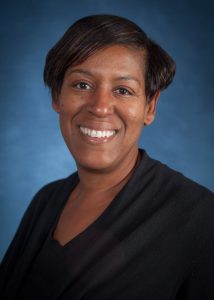 Lora Whitfield is a Clark College alumna, having earned her Associate in Applied Science in Early Childhood Education in 2002. She earned her Master of Arts in Human Development with a specialization in Early Childhood Education and Bi-Cultural Development from Pacific Oaks College. Whitfield has work experience at Albina Early Head Start in Portland, Ore., and at the Southwest Washington Child Care Consortium.
Lora Whitfield is a Clark College alumna, having earned her Associate in Applied Science in Early Childhood Education in 2002. She earned her Master of Arts in Human Development with a specialization in Early Childhood Education and Bi-Cultural Development from Pacific Oaks College. Whitfield has work experience at Albina Early Head Start in Portland, Ore., and at the Southwest Washington Child Care Consortium.
During her time teaching at Clark, Whitfield has served on the Clark College Early Childhood Advisory Committee, the Early Childhood Teacher Preparation Council, the State Board Faculty of Color Mentorship Program, and the National Association for the Education of Young Children.
“As an educator, I am committed to treating each individual with respect,” Whitfield said. “I believe respect is paramount in creating environments that promote students’ ideas, passions, and interests in a meaningful and organic way. I strive to provide settings where everyone can share their ideas without bias and be included in all aspects of learning.”
Addition on June 14: Kay Cook
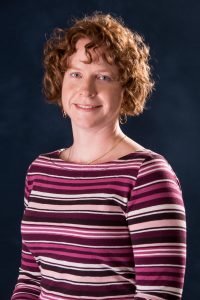
Math professor Kate Cook was granted tenure during the Clark College Board of Trustees meeting on June 14.
Cook earned her bachelor’s degree in mathematics and education at Principia College in Illinois and her master’s degree in mathematics at California State University, East Bay. She has previous teaching experience at Portland Community College and began teaching at Clark as an adjunct in 2008.
Cook’s involvement at Clark includes leading the Core to College Grant team, serving as the course coordinator for statistics courses in the Mathematics Department, and presenting mathematics worksheet ideas at local and national conferences.
“I try to meet the student at their level and encourage them forward to new confidence and ability in math,” said Cook, who lives in Vancouver. “I’ve found that a bit of humor helps make that rocky path more enjoyable.”
